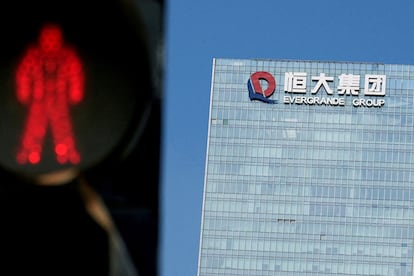Evergrande: A timeline of the great Chinese brick empire’s downfall
The company’s collapse shows the liquidity crisis that sweeping the Asian giant’s real estate sector

Evergrande has become the most visible face of the deep liquidity crisis that has been sweeping China’s real estate sector in recent years. The industry represents a quarter of the second-largest economy on the planet. The company led the market until 2021, when its serious financial problems began to come to light: it had a large debt that snowballed until the company’s liquidation was decreed by a Hong Kong court on Monday after months of turmoil.
Below are the key dates in Evergrande’s collapse.
August 2021: A warning from the authorities
The construction of numerous Evergrande projects throughout China experience stoppages because of debts coming due. Faced with this situation, the central bank and financial authorities summon the group’s leaders, urging them to reduce debt risks and prioritize stability.
September 2021: Default on payments and free fall on the stock market
The clearest signs of financial problems are coming from the world’s most indebted real estate company. With a debt of $305 billion, Evergrande defaults on interest payments on two bonds contracted abroad for $131 million, which have a grace period of 30 days. The company’s shares are in free fall on the Hong Kong Stock Exchange. The real estate company warns about the risks of cross-default (default on certain bonds triggering defaults on other financial instruments) due to the slump in property sales.
October 2021: Dodging bankruptcy
Evergrande suspends the trading of its shares in Hong Kong on October 4 and resumes trading on October 21, albeit with a 10% drop in value. The company, which was due to repay $721 million in dollar-denominated bonds and $436 million in domestic yuan bonds between October and December, avoids bankruptcy after depositing these payments at the last minute.
November 2021: Xu Jiayin reduces his stake in the company
Xu Jiayin, the firm’s chairman who founded the company in 1996, reduces his stake from 77% to 67.9% after selling 1.2 billion shares.
December 2021: Insolvency
The Chinese brick giant is once again facing liquidity problems and defaulting on its debts. The Fitch rating agency declares it insolvent after its official default on the repayment it previously agreed to with its lenders in dollars, amounting to some $82.3 million. Its shares fall to the lowest level since the conglomerate debuted on the market in 2009. The company announces that it will negotiate a restructuring plan with its overseas creditors.
March 2022: The seizure of deposits
Evergrande once again suspends the trading of its shares, citing the inability to produce audited results. In addition, an investigation into the property management unit is opened; banks confiscate 13.4 billion yuan (over $1.86 billion) in deposits from the same.
January 2023: The auditor resigns
PriceWaterhouseCoopers announces that it will not continue to audit the indebted real estate company as it believed that it had not received sufficient information on some key matters for evaluating the company’s accounts in 2021.
March 2023: Restructuring
Evergrande presents a plan to restructure part of its offshore debt and offers holders of such bonds new debt securities with the same value and “equity-linked instruments,” which can be converted into shares of its property management or electric vehicle subsidiaries, both of which are listed in Hong Kong.
July 2023: Losses
Evergrande reports huge net losses: in 2021 they totaled 476.035 billion yuan ($66 billion) and, in 2022, they were 105.914 billion yuan ($14.9 billion). In 2020, the group had generated 8.076 billion yuan ($1.13 billion) in profits.
August 2023: Bankruptcy in the U.S.
Evergrande invokes the suspension of payments law in the United States to avoid the seizure of its assets. This law allows foreign firms that are in the process of restructuring to suspend payments on their international debts in the U.S. The conglomerate announces losses of 33.012 billion yuan ($4.6 billion) in the first half of the year, 50.4% less than during the same period of the previous year. The company’s shares are back on the Hong Kong stock exchange after being suspended for five months. However, they take losses of 79%. Evergrande had already lost over 90% of its stock market value when it suspended the trading of its shares in March.
September 2023: Arrests
Shenzhen Police arrest several employees of an Evergrande financial subsidiary, Evergrande Financial Wealth Management. Shortly thereafter, the conglomerate postpones its debt restructuring meetings, citing the need to reevaluate the terms of the proposal. On September 25, Evergrande announces that it cannot comply with the requirements for issuing new debt securities because its subsidiary Hengda Real Estate Group is under investigation by the China Securities and Exchange Regulatory Commission for alleged illegal disclosure of information.
On September 28, it suspends trading on the Hong Kong stock exchange again, after it goes public that Evergrande’s CEO and chairman is under investigation. Xu has been under “house arrest” since then.
December 2023: Creditor opposition
A Hong Kong court approves the seventh extension for Evergrande to finalize its restructuring plan. Later, it is learned that bondholders strongly oppose the company’s revised terms.
January 2024: Liquidation
On January 8, Evergrande’s electric vehicle subsidiary reveals that its vice chairman, Liu Yongzhuo, was arrested and is under police investigation. The group’s creditors join the complaint seeking the developer’s liquidation.
After over a year and a half of unsuccessful attempts to restructure its offshore debt, on January 29 a Hong Kong court decrees the company’s liquidation.
Sign up for our weekly newsletter to get more English-language news coverage from EL PAÍS USA Edition
Tu suscripción se está usando en otro dispositivo
¿Quieres añadir otro usuario a tu suscripción?
Si continúas leyendo en este dispositivo, no se podrá leer en el otro.
FlechaTu suscripción se está usando en otro dispositivo y solo puedes acceder a EL PAÍS desde un dispositivo a la vez.
Si quieres compartir tu cuenta, cambia tu suscripción a la modalidad Premium, así podrás añadir otro usuario. Cada uno accederá con su propia cuenta de email, lo que os permitirá personalizar vuestra experiencia en EL PAÍS.
¿Tienes una suscripción de empresa? Accede aquí para contratar más cuentas.
En el caso de no saber quién está usando tu cuenta, te recomendamos cambiar tu contraseña aquí.
Si decides continuar compartiendo tu cuenta, este mensaje se mostrará en tu dispositivo y en el de la otra persona que está usando tu cuenta de forma indefinida, afectando a tu experiencia de lectura. Puedes consultar aquí los términos y condiciones de la suscripción digital.









































